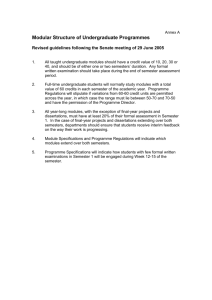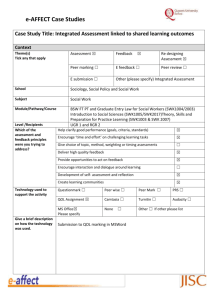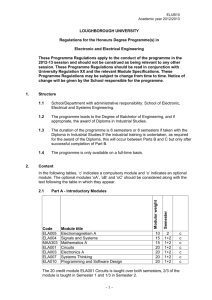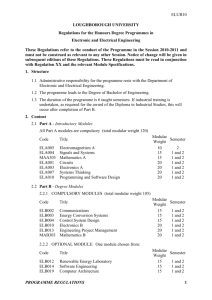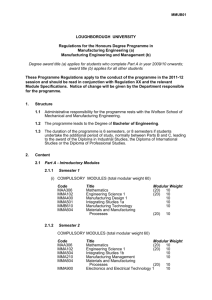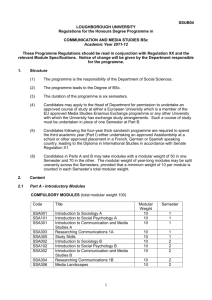Electronics & Softwa.. - Loughborough University
advertisement
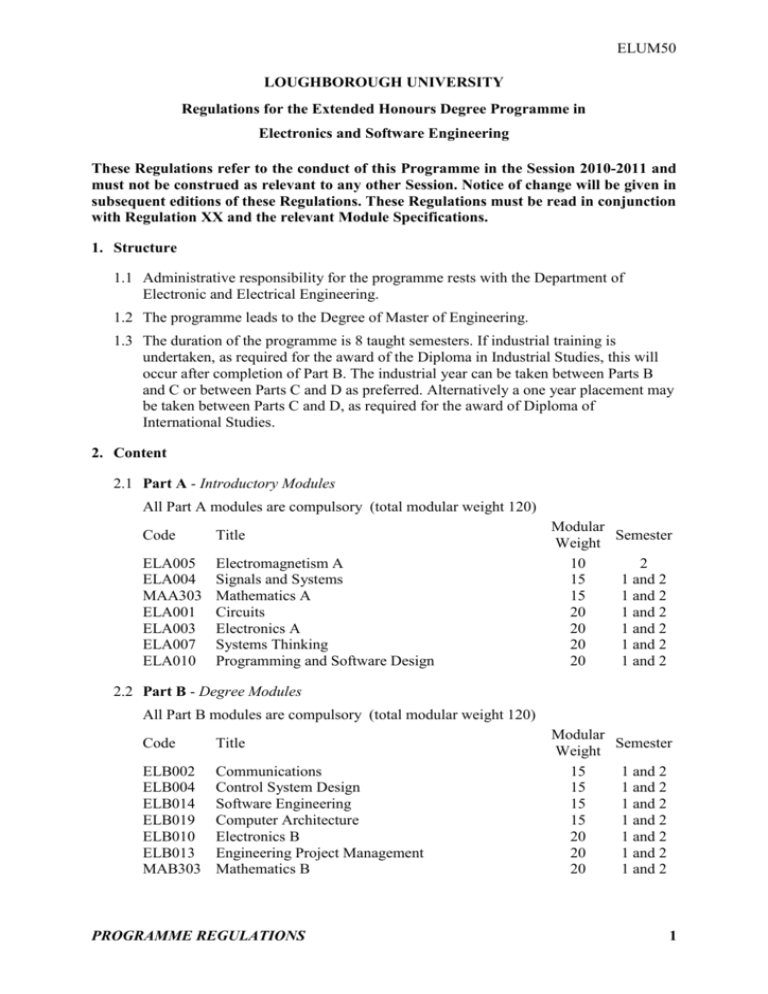
ELUM50 LOUGHBOROUGH UNIVERSITY Regulations for the Extended Honours Degree Programme in Electronics and Software Engineering These Regulations refer to the conduct of this Programme in the Session 2010-2011 and must not be construed as relevant to any other Session. Notice of change will be given in subsequent editions of these Regulations. These Regulations must be read in conjunction with Regulation XX and the relevant Module Specifications. 1. Structure 1.1 Administrative responsibility for the programme rests with the Department of Electronic and Electrical Engineering. 1.2 The programme leads to the Degree of Master of Engineering. 1.3 The duration of the programme is 8 taught semesters. If industrial training is undertaken, as required for the award of the Diploma in Industrial Studies, this will occur after completion of Part B. The industrial year can be taken between Parts B and C or between Parts C and D as preferred. Alternatively a one year placement may be taken between Parts C and D, as required for the award of Diploma of International Studies. 2. Content 2.1 Part A - Introductory Modules All Part A modules are compulsory (total modular weight 120) Code Title ELA005 ELA004 MAA303 ELA001 ELA003 ELA007 ELA010 Electromagnetism A Signals and Systems Mathematics A Circuits Electronics A Systems Thinking Programming and Software Design Modular Semester Weight 10 2 15 1 and 2 15 1 and 2 20 1 and 2 20 1 and 2 20 1 and 2 20 1 and 2 2.2 Part B - Degree Modules All Part B modules are compulsory (total modular weight 120) Code Title ELB002 ELB004 ELB014 ELB019 ELB010 ELB013 MAB303 Communications Control System Design Software Engineering Computer Architecture Electronics B Engineering Project Management Mathematics B PROGRAMME REGULATIONS Modular Semester Weight 15 1 and 2 15 1 and 2 15 1 and 2 15 1 and 2 20 1 and 2 20 1 and 2 20 1 and 2 1 ELUM50 2.3 Part C - Degree Modules All Part C modules are compulsory (total modular weight 120) Code Title ELC008 ELC010 ELC011 ELC018 ELC054 ELC055 ELD001 Business Management Microprocessor Architecture VLSI Devices and Technology Real-Time Software Engineering Electronic System Design with FPGAs Digital Interfacing and Instrumentation Electrical Group Project Modular Semester Weight 15 1 and 2 15 1 and 2 15 1 and 2 15 1 and 2 15 1 and 2 15 1 and 2 30 1 and 2 2.4 Part D - Degree Modules 2.4.1 COMPULSORY MODULES (total modular weight 90) Code Title ELD005 Application Specific Integrated Circuit (ASIC) Engineering Embedded System Verification Applying Management Theory Advanced Project ELD004 ELD034 ELD030 Modular Semester Weight 15 1 15 10 50 2 1 and 2 1 and 2 2.4.2 OPTIONAL MODULES: Two modules chosen from: Code Title ELD506 ELD511 ELD507 ELD508 Fundamentals of Digital Signal Processing Information Theory and Coding Intelligent Signal Processing Digital Signal Processing for Software Defined Radio Microcontroller Laboratory ELD023 Modular Semester Weight 15 1 15 1 15 2 15 2 15 1 and 2 All module choice is subject to availability, timetabling, prerequisite, preclusive and student number restrictions. Any difficulties arising from optional module choice will not normally be considered as the basis of a claim for impaired performance. 3. Assessment 3.1 Assessment Elements Modules taught in both semesters have elements of their assessment in both semesters. Examinations for modules taught in both semesters usually take place during the semester two examination period. Examinations for modules taught in one semester usually take place at the end of the semester in which they are delivered. PROGRAMME REGULATIONS 2 ELUM50 3.2 Criteria for Progression and Degree Award In addition to satisfying the requirements set out in Regulation XX candidates must satisfy the following criteria: In order to progress from Part A to Part B candidates must normally obtain: (a) an overall average mark of at least 55% in Part A. In order to progress from Part B to Part C candidates must normally obtain: (a) a mark of at least 30% in each of the modules taken in Part B. (b) an overall average mark of at least 55% in Part B. In order to progress from Part C to Part D candidates must normally obtain: (a) a mark of at least 30% in each of the modules taken in Part C. (b) an overall average mark of at least 55% in Part C. To be eligible for the award of Master of Engineering, candidates must normally obtain: (a) a mark of at least 50% in each of the postgraduate modules (including ELD5xx numbers) taken in Part D. 3.3 Relative weighting of parts of the programme for the purposes of final degree classification Final degree classification will be determined on the basis of performance in degree level module assessments in parts B, C and D, in accordance with the scheme set out in Regulation XX. The average percentage marks for each part are combined in the ratio: Part B - 15, Part C - 42·5, Part D - 42·5. 3.4 Criteria for candidates who do not satisfy the requirements for progression or degree award 3.4.1 Any candidate who fails to satisfy the requirements for progression from Part A to Part B may nevertheless qualify to progress by repeating module assessments in accordance with the provision of Regulation XX. Alternatively, the candidate may elect to enter any BEng degree programme in the Department if the requirements for progression for that programme have been achieved. Failure at MEng reassessment will not affect subsequently entry to the BEng programme. 3.4.2 Any candidate who fails to satisfy the requirements for progression from Part B to Part C may nevertheless qualify to progress by repeating module assessments in accordance with the provision of Regulation XX. Alternatively, the candidate may elect to enter the BEng degree programme in Electronic and Electrical Engineering if the requirements for progression for that programme have been achieved. Failure at MEng reassessment will not affect subsequently entry to the BEng programme. PROGRAMME REGULATIONS 3 ELUM50 3.4.3 Any candidate who fails to satisfy the requirements for progression from Part C to Part D may nevertheless qualify to progress by repeating module assessments in accordance with the provision of Regulation XX. Alternatively, the candidate may elect to enter Part C of the BEng degree programme in Electronic and Electrical Engineering and on successful completion of the requirements of that programme qualify for the award of Bachelor of Engineering. 3.4.4 Any candidate who fails to satisfy the requirements for the award of Master of Engineering may nevertheless qualify for the award by repeating module assessments in accordance with the provision of Regulation XX. Alternatively, the candidate may elect to enter Part C of the BEng degree programme in Electronic and Electrical Engineering and on successful completion of the requirements of that programme qualify for the award of Bachelor of Engineering. Such a BEng award would be based on the candidate’s previous performance in Part C of the MEng programme with credit in the Advanced Project module ELD030 transferred where applicable. 3.5 Re-Assessment Provision is made in accordance with Regulation XX for candidates who have the right of re-assessment in any part of the programme to undergo this in the University's special assessment period. However: (i) Where a candidate has achieved fewer than 60 credits in any part of the programme, reassessment in that part may not be undertaken in the special assessment period. (ii) Coursework re-assessment for exercises undertaken in groups and/or involving constructional, experimental or laboratory work may not be available during the special assessment period. (iii) Most postgraduate modules (ELD5xx numbers) are not available in the special assessment period. August, 2010 PROGRAMME REGULATIONS 4


